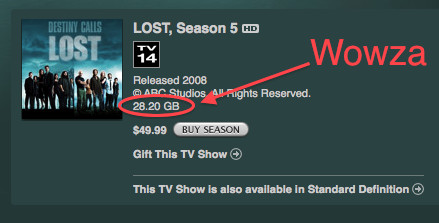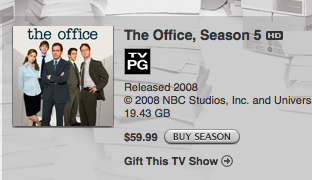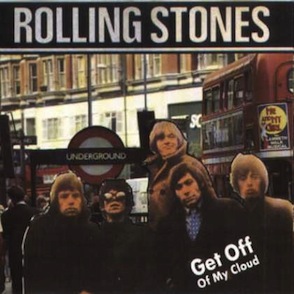 Here we are on the eve of another Apple event. There is never a shortage of hype surrounding these, but this one may have a bit more than normal because of the possibility that it could be Apple CEO Steve Jobs’ first public gig since returning to the company following a lengthy and very serious medical leave of absence.
Here we are on the eve of another Apple event. There is never a shortage of hype surrounding these, but this one may have a bit more than normal because of the possibility that it could be Apple CEO Steve Jobs’ first public gig since returning to the company following a lengthy and very serious medical leave of absence.
But it’s entirely possible that Jobs won’t be leading this event. And it’s starting to look more possible that what’s thought to be the key product, iPods with cameras, may have to be delayed. And that tablet computer seems pretty unlikely. And The Beatles on iTunes is far from a lock. In other words, there are a lot of possible ways that Apple could disappoint with this event.
But Apple doesn’t like to disappoint, it likes to surprise. And that’s why I’m holding out hope for a big one: iTunes in the cloud.
Now, the likelihood of Apple announcing this on Wednesday seems fairly small. After all, even if Apple has to delay the launch of it iPods with cameras, it will still likely announce them at the event. And it likely has a new, more social iTunes 9, and its new “Cocktail” music format ready to be announced as well. All of that would seem to be enough for what will be a relatively small event in San Francisco — especially if Jobs does take the stage.
But, as myself and others have noted before, iTunes in the cloud is inevitable.
An Expansion Of Music
When iTunes was confined solely to music on your desktop, life was good. There was a lot of talk about how subscription-based streaming services would kill the pay-to-download iTunes model, but that never happened. Instead, iTunes continued to dominate the landscape.
 But things are evolving. The new hotshot in the music space is Spotify, which despite not being available in the U.S. yet, has plenty of people going gaga. The interesting thing about it is that everyone praises its user experience and being second-to-none, including yes, iTunes. Spotify has raised a ton of money, and counts some some of the major music labels as investors, and also just launched an iPhone app. As Apple is attempting to make its software more social, you had better believe they are watching the reaction to Spotify closely.
But things are evolving. The new hotshot in the music space is Spotify, which despite not being available in the U.S. yet, has plenty of people going gaga. The interesting thing about it is that everyone praises its user experience and being second-to-none, including yes, iTunes. Spotify has raised a ton of money, and counts some some of the major music labels as investors, and also just launched an iPhone app. As Apple is attempting to make its software more social, you had better believe they are watching the reaction to Spotify closely.
And iTunes itself is evolving. As we are likely to see on Wednesday, Apple and the music labels are pushing for these new “Cocktail” type album downloads that feature much more than just music. A key component is likely to be video, which obviously takes up a lot more space than music. That, alongside Apple’s move earlier this year to a fully iTunes Plus (DRM-free) store, has meant that the space needed to hold all of this music has been going up.
As most people have computers these days with large hard drives, they have been able to handle iTunes music on their machines without much trouble. But a push for more video — especially if it’s HD video — will mean more storage that is needed. And that’s before we get to the real keys to the iTunes in the cloud idea: Movies and television shows.
iTunes’ Video Problem
Apple has obviously been increasing its movie and television show library over the past few years. It now has a fairly robust offering, including many shows and movies in high definition (HD). But have you ever really looked at the size of those files? Anyone who has more than a few of them likely has, because you were probably forced to, as you were running out of room on your hard drive.
Let’s look at the most recent season of ABC’s show Lost. If you bought the HD Season Pass of the show on iTunes, that’s 28.2 GB of data on your hard drive. That’s one season. Of one show.
 Say you also bought last season of The Office (a 30-minute show versus the hour-long Lost), that’s 19.43 GB. Those two shows alone — again, just one season of each — have nearly 50 GB of your hard drive tied up right there. Throw a few HD movies (usually 3 to 4 GB each), and maybe a few more shows and you’re going to need hundreds of gigabytes for all of these. And God forbid you want the other 4 seasons of Lost or The Office.
Say you also bought last season of The Office (a 30-minute show versus the hour-long Lost), that’s 19.43 GB. Those two shows alone — again, just one season of each — have nearly 50 GB of your hard drive tied up right there. Throw a few HD movies (usually 3 to 4 GB each), and maybe a few more shows and you’re going to need hundreds of gigabytes for all of these. And God forbid you want the other 4 seasons of Lost or The Office.
The way to combat this problem right now is to do what I did: Buy terabyte external hard drives. But let’s be honest, most average consumers are not going to do that. If and when they see that their entire hard drive has been eaten up by season 3 of My Name Is Earl, they’re going to be upset. It’s probably more likely that they’d simply delete the content. But should they really have to do that for content they paid for? Of course not.
Apple’s Options
That leaves Apple with two options:
1) Offer television show rentals. This is certainly something it could, and may do, but it would be a short-term fix.
2) Move iTunes fully to the cloud.
 Actually, iTunes is really already is in the cloud — kind of. If you delete a piece of content from your machine, Apple will allow you to download it again (at least once). This is more or less the idea of how iTunes in the cloud would work. Rather than storing all your media locally on your machine, it would be stored on iTunes’ servers in the cloud — which again, they’re already doing.
Actually, iTunes is really already is in the cloud — kind of. If you delete a piece of content from your machine, Apple will allow you to download it again (at least once). This is more or less the idea of how iTunes in the cloud would work. Rather than storing all your media locally on your machine, it would be stored on iTunes’ servers in the cloud — which again, they’re already doing.
If you bought a television show, movie or even song, you’d be able to stream it from Apple’s servers. Or, if you wanted to take it on the go, on your iPod or iPhone, you could download it and store a physical copy locally. There would be no risk in deleting content locally when you were done with it, because Apple would have a copy for you to obtain again.
Concerns
Now, this idea is so obvious that it has to be coming, right? Well, there are obviously some concerns as well. First, security. The music labels and television and movie studios would want assurances from Apple that no one could “game the system” and get access to content for free. With iTunes in the cloud, Apple would likely have to partially rework the 5 computers-at-a-time system for iTunes that it uses right now (for DRM content), but something similar would probably be intact.
The second concern would be cost. Apple undoutbedly spends a lot of money now serving music and movies over iTunes, but it’s for the most part a one-time deal, where a user pays and then downloads the content. If you introduce streaming into the mix, costs will go up. But perhaps that is part of the reason behind Apple’s new massive 500,000 sqaure foot datacenter in North Carolina — which will be one of the largest in the world.
Untenable
 The fact of the matter is that any way you slice it, iTunes current model is untenable. Even if you opt to get standard definition video content from the service, we’re talking ten to a dozen gigabytes of storage needed for just one season of a television show. Movies are still over a gigabyte a piece. If you buy as much content as Apple and the studios would like you to, you’re going to fairly quickly get into the hundreds of gigabytes and then terabytes range. I should know, I’m already there.
The fact of the matter is that any way you slice it, iTunes current model is untenable. Even if you opt to get standard definition video content from the service, we’re talking ten to a dozen gigabytes of storage needed for just one season of a television show. Movies are still over a gigabyte a piece. If you buy as much content as Apple and the studios would like you to, you’re going to fairly quickly get into the hundreds of gigabytes and then terabytes range. I should know, I’m already there.
Meanwhile, there’s a movement underway to more portable machines that feature smaller amounts of storage. Obviously, there are netbooks, but you can also be sure that Apple’s tablet device, when it comes out, will not have a terabyte of storage. And Apple itself has been starting to push faster, but smaller capacity, SSD drivers in its laptop lines.
The larger point is that while it’s great to own your own content, most customers likely do not want terabytes of data cluttering up their machines. It becomes a huge management burden. And if you get a new machine, transfers are a hassle.
There are some other short-term solutions, like the aforementioned TV show rentals, but long term, the only viable model would seem to be Apple holding all of this content for us on its servers. Streaming a huge collection of movies works beautifully right now for Netflix via its Watch Instantly service. Apple would need a download component to supplement its portable devices, but it likely can and will be done.
Months ago, there were rumors of such a service called “iTunes Replay” for iTunes 8, but nothing ever came of them. But since then, Apple has launched services like HD movie downloads — the need for such a service is only getting greater. And it will continue to.
Apple chose to use a Rolling Stones’ lyric as the tagline for this event, “It’s only rock and roll, but we like it.” Here’s to hoping that they work in another Stones’ lyric as well, “On my cloud, baby.”